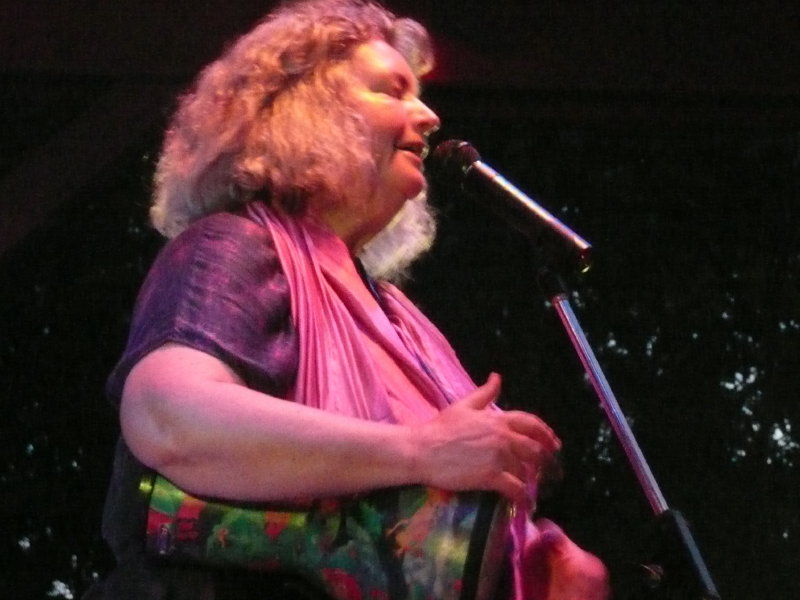During the past decade, most Americans have accepted and embraced the need to go "green." For some, this simply means a commitment to composting or using natural cleaning products. For others, it runs deeper.
Starhawk is a well respected writer on the topic of modern Earth-based spirituality and an activist for environmental issues.
Starhawk, who lives part-time in San Francisco with her partner and friends and part-time in a little hut in western Sonoma Valley, will visit Milwaukee to conduct a variety of lectures and workshops at the First Unitarian Society, 1342 N. Astor St.
She has authored or co-authored 11 books, including her latest, a children’s book called "The Last Wild Witch." She is also a filmmaker, a panelist for Newsweek / Washington Post’s Web site on religion called "On Faith," an Earth activist coach, community volunteer and more.
Recently, OnMilwaukee.com spoke to Starhawk about her new book, her Earth-based messages and what it means to be a modern-day witch.
OnMilwaukee.com: What are your main thoughts that you’re sharing on this tour?
Starhawk: Our need to connect with the natural world. This theme runs through all of the spiritual and political work I do, as well as my new kids’ book. The goddess traditions say the Earth is sacred and alive and a living being, and to be healthy, vibrant people we need a connection with the natural world.
Climate change is not about a gradual warming of the Earth, even though people in Wisconsin might think it is a good thing (laughing). But we live in a culture that’s not dealing with climate change. Our culture seems to think the environment is optional; that it’s not necessary.
My message is we have not escaped nature, we are still part of it, just as much as our ancestors were. We just have more ways to separate ourselves.
OMC: What inspired you to write a kids' book, "The Last Wild Witch?"
S: Actually, I wrote the book 15 years ago because I was mad. I read a stupid book about witches for kids, and I decided I needed to write something positive for those of us who call ourselves "witches."
We know the word goes back to pre-Christian spirituality ... and that we were the shamans and the medicine people who knew where the healing herbs grew and how to soothe the spirit if you were upset. We were the healers of the tribe. But witches got negative connotation because of many years of persecution against everything that was left of the old nature-based faith.
OMC: What is the book about?
S: I wanted something more positive about witches, so the last wild witch lives in the magic forrest outside a "perfect" town filled with rules. And everyone obeys the rules unless the wildness gets into them, which it occasionally does. This upsets the grown-ups, and they blame the witch and decide to destroy the witch and the wildness, but the children find a way for them to appreciate it instead.
OMC: Why did it take you so long to publish the book?
S: I couldn’t interest my publishers in the book. In the publishing world, kids’ books are separate from adults’ books. So, it sat in a drawer and I forgot about it.
Then, I met some people from Mother Tongue Ink, the publishing company that creates the popular We’ Moon calendar. They have a very dedicated following and they were interested in expanding into other kinds of publishing. I told them about the book and they asked to publish it.
OMC: After your mini tour, what are your plans for the near future?
S: Besides writing, I run a program. It’s an Earth activist training program that teaches people the skills needed to reconnect with nature from organic gardening to alternative energy, but mostly about how all of the techniques fit together into systems that reinforce each other.
For example, it’s not just about planting an organic garden, but also choosing flowers that help each other grow and contribute to the fertility of the soil ... Or designing a building that creates more energy than it uses.
I also create community gardens with at-risk youth in the inner city of San Francisco.
OMC: If someone attends one of your workshops or rituals, what will they walk away with?
S: When I talk or give workshops I try to provide a sense of hope or empowerment regarding what can be done on a personal level, so we’re listening and learning how to be an advocate on a larger level. And how to make our voices heard.
But most of all, we create ritual and sacred space and hopefully people walk away feeling like they had a lot of fun.
Molly Snyder started writing and publishing her work at the age 10, when her community newspaper printed her poem, "The Unicorn.” Since then, she's expanded beyond the subject of mythical creatures and written in many different mediums but, nearest and dearest to her heart, thousands of articles for OnMilwaukee.
Molly is a regular contributor to FOX6 News and numerous radio stations as well as the co-host of "Dandelions: A Podcast For Women.” She's received five Milwaukee Press Club Awards, served as the Pfister Narrator and is the Wisconsin State Fair’s Celebrity Cream Puff Eating Champion of 2019.



